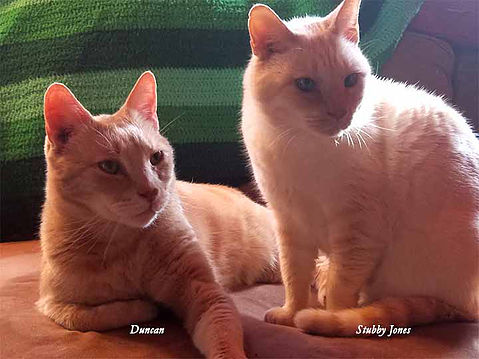“NO!!! Seriously?!?!” I yelled. “I can’t believe you just did that!!”
Duncan, one of our cats, had thrown up on our living room floor in three places. The wood floor had just been waxed and wasn’t completely dry yet. He looked at me startled and then slowly walked across the room and climbed the stairs to our bedroom and went under the bed.
I felt horrible. Yelling at a cat when he throws up is stupid. It wasn’t his fault, nor was it something he did to make me angry. He’s a cat. They do that. But in that moment, it felt like my whole day added up to his puke and I snapped. He threw up several more times during the week, so we took him to the vet over the weekend. His doctor told us he felt a small mass in his abdomen and he needs to go for more tests to get a diagnosis. Duncan was an adult when we rescued him, and he has lived with us for 12 years. Even though he is no youngster, this news was surprising—and very upsetting. It was a painful reminder of how fast life can change and break your heart.
I was immediately guilt-ridden for yelling at him when he threw up on the wet floor. I wanted to take it back. My next thought was of earlier in the week when I pushed him off my laptop. He was bugging me for attention, and I wanted to work. Throwing up on the floor is part of living with a pet, and sitting on my hands while I type is something Duncan has done for years to get me to play with him. Hearing the news about him reminded me that getting upset about things so trivial is idiotic and pointless—and something I will feel bad about when I say goodbye.
When we had to put down our first cat, Spider Jim, it was the first time I truly felt that enlightening moment. As he, my husband and I sat in the waiting room on his last day I thought back over our 18 years together, and I was filled with remorse. I wanted more than anything to take back every time I ever yelled at him for stupid stuff like licking plastic or tearing up a toilet paper roll. It would not have mattered if I could have apologized to him in his last moments; he wouldn’t have understood, and that made me feel worse. When his companion, The Chubbster, died less than a year later, I was again confronted with how exceptionally painful those last moments are if you feel any regret.
I have been with friends and family when they passed away, and I felt tremendous sadness, pain and loss, but it never translated into making me a kinder or more thoughtful person. Being with our cats in their last moments did that. You can hope or guess that loved ones understand your better intentions, but you can’t know that with your cats. The unconditional, nonjudgmental, uncompromising love our cats gave us made anger and frustration with them seem all the more ridiculous and self-centered. Even more so since they didn’t yell at us for our misbehaviors. They forgave, forgot and moved on.
We are human. There is no question we are going to get upset with loved ones. But transgressions—by anyone—do not need anger to get corrected. They don’t demand bullish behavior to get resolved or hateful language to get fixed. Those behaviors serve no one. I clearly still have moments when I snap, but I have matured and grown greatly thanks to our cats. They have taught me it is better to have patience and let things go. To think before I speak and pause before I react. And if I screw up and make a mess of things, then I have to clean it up and forgive, forget and move on. Life is kinder for everyone all around that way.


